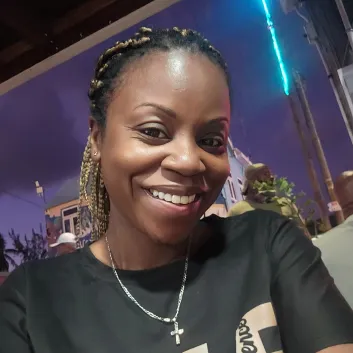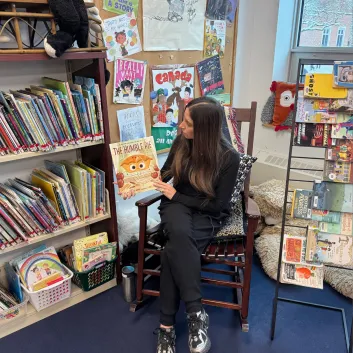- From the Community
- February 3, 2023
Black History Month: Meet Masini
“Throughout history, Black women have faced dangerous stigmas. Some of which have ranged from being aggressive, angry, and ignorant to being strong, confident, and loud. Being a plus-size Black woman, many of these stigmas have followed me throughout my life. I’m used to hearing things like, ‘Masini, you are so funny!’ or ‘You don’t have to have such an attitude.’ And of course, ‘You are such a strong Black woman. You can handle anything.’ Without really understanding that these phrases are forms of microaggressions, I took some of them as compliments and wore them like a badge of honour. Saying things to myself like, ‘Yes, I am strong,’ ‘You’re right, I am hilarious,’ and ‘I don’t have an attitude, I’m just confident.’
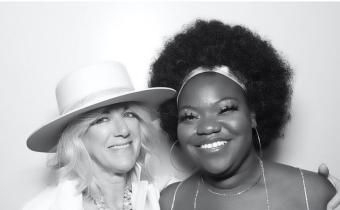
I realize now that not everything I say is a joke, that my confidence wavers and I sometimes feel insecure about my body, and there is no possible way that I can ALWAYS be strong, especially with a chronic illness. My blackness is met with so many challenges in general, and my femininity is a social construct that can often feel like a burden. All of that has nothing and everything to do with how funny I am, how much confidence I have, and how much of a ‘strong Black woman’ I am. My blackness and divine womanhood are a reminder to myself that those two parts of me don’t define who I am. They are parts of me, not all of me.
It’s sad to say, but I was surprised I was taken seriously when I first started experiencing signs of MS. So often, Black women aren’t believed and constantly have to put on a brave face. Thankfully I have been taught that no matter what, I have to advocate for myself because who else will. Although, I will admit I had a hard time accepting I wasn’t okay. I am so used to masking what I’m feeling, and it was hard for me to ask for help.
I was on a trip in May 2021, when I began experiencing numbness on the entire left side of my body. At the time, I thought maybe I had just slept wrong. When I got home, I went to the doctor and was told that I needed to go to the hospital immediately. They did blood work and a CT scan, and to all of our surprise, the results came back normal. A few weeks later, I had an MRI, which showed lesions on my brain and spine. The months that followed were agonizing and filled with so many questions. After many tests, new lesions on my brain, and visits to the MS Clinic at St. Michael’s Hospital, I was officially diagnosed with relapsing-remitting multiple sclerosis (RRMS) in February 2022—almost a full year after my first symptoms.
I will never forget the day I received my diagnosis. I was happy that I finally had answers, confused because I didn’t know what it would mean for my future, angry that this was happening to me, and sad knowing what MS looked like for many others. Shockingly enough, my father has MS and I just couldn’t believe that this was now my destiny, especially because this disease isn’t hereditary.
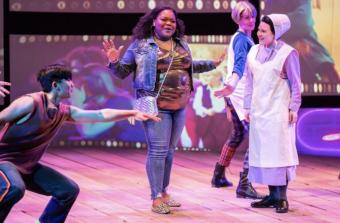
I’m a professional actor and in March 2022, I began a contract for a new Canadian musical (Grow) at the Grand Theatre in London, Ontario. It was my first musical since the lockdown in 2020. I’ve had my fair share of nerves for shows I’ve done in the past, but I was beyond nervous this time around. I was nervous about my memory, body, and overall health, but I was honest about my circumstances with those around me and most importantly, I was honest with myself. Honesty is what got me through. Work can be challenging in general, but performing in front of hundreds of people, doing 8 shows 6 days a week, is a lot for any performer, let alone with the symptoms I was experiencing. I am so proud that I not only did it and performed to the best of my ability, but that I also succeeded without a relapse.
I take things day by day. Some daily symptoms I experience are fatigue, imbalance, brain fog, body aches, back and leg pain, and frustrating mood swings. Those symptoms are mild in comparison to some of the more extreme relapses I have experienced—optic neuritis (which partially blinded me in my right eye and also caused me to become colour blind), a flare up that affected my left leg, and of course, my very first relapse when I experienced numbness on the left side of my body. All of these symptoms cause anxiety for me. I go to bed worried about how I will feel in the morning. I am still learning how to manage my pain and anxiety in the healthiest ways possible.
Luckily, I have a beautiful and diverse support system. At the top is my incredible mother—a strong Black woman, Coordinator of the Black Student Engagement program at the University of Toronto Scarborough campus, and my very first advocate and teacher who has been there for me every step of the way, despite her own health issues. Then there’s my grandmother, another strong Black woman who is there for her girls no matter what. I also have my chosen family from various chapters of my life—a diverse group of people that have shown me love in more ways than I knew possible. I don’t think I could have gone through any of this without these people. My family and friends near and far have loved me, uplifted me, and have been there for me, and for that I am eternally thankful.
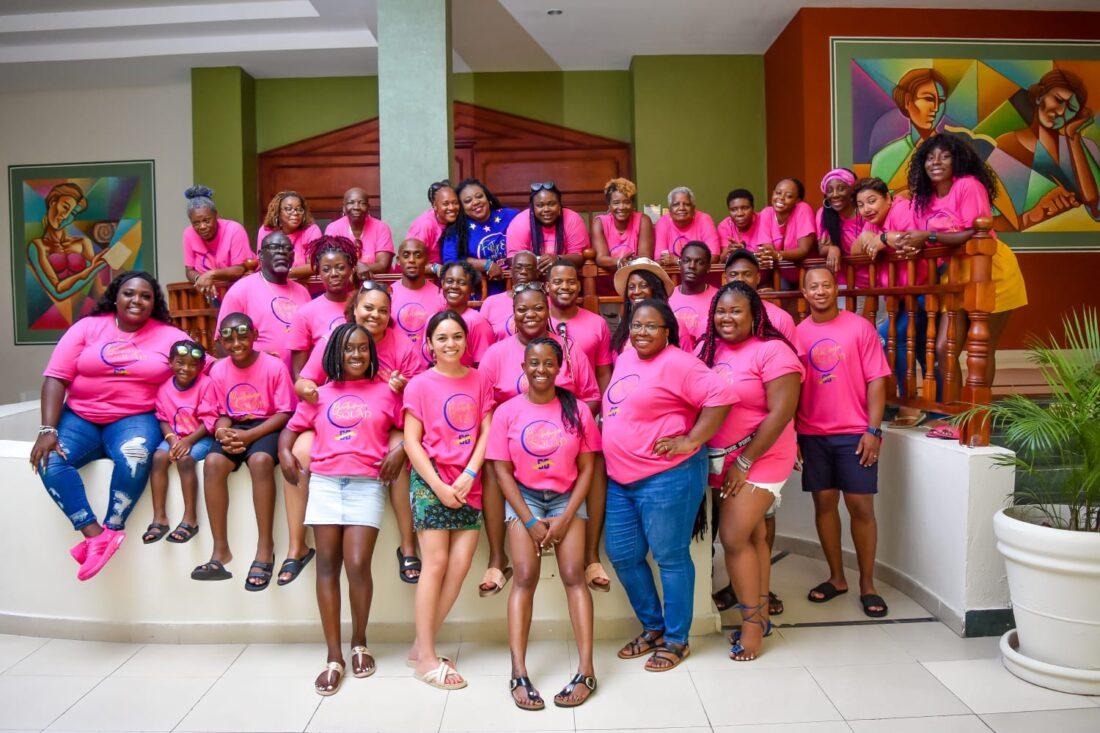
This journey is new for me, and I’m happy to have a community I can go to for support. When I was first diagnosed, I felt like I had a dirty little secret. I was carrying around such shame and guilt, like I somehow did this to myself. Suddenly I found myself staring into my phone sharing my thoughts and feelings on Instagram. I never thought I would be the kind of person that would be as open as I’ve been on social media, but I realized the beautiful benefits of being open and honest. I’ve been able to connect with people who are also suffering with chronic illnesses, give advice to people, and meet others with MS and ask them questions. Who knew that Instagram could liberate me.
MS doesn’t look one way. I didn’t know that MS affected Black women in some of the same ways as White women. I didn’t know that MS could be a manageable illness. I didn’t know that I could still be an artist. I didn’t know that I could just be a young woman with this disease. Seeing different faces and representation is crucial to feeling seen and not feeling alone.

If you feel like there isn’t a voice that matches your own out there, be that voice. Reach out and advocate for more voices that match your own. Know that there is someone that feels what you’re feeling. You are not alone. Your voice matters.
Black History Month is a time when we have the privilege to recognize, honour, and celebrate Black joy, excellence, and the important contributions Black people have made in society. For me, it’s also a reminder that I come from a long line of survivors. I’ve been taught to show appreciation to the ancestors that endured many atrocities before me. Now, I am blessed to be able to make small contributions to my community and hopefully the generation that will come after me.
To all my beautiful Black sisters out there that are facing their diagnosis head on, I see you, I honour you, I am with you! We are chronically underestimated!”
All people living with multiple sclerosis deserve to see themselves represented in the stories we tell. We know that it is much more than just one month, week, or day and are committed to representing and amplifying voices from diverse perspectives all year round.
Share your experience living with or being affected by MS.
You can help more Canadians living with MS
You make stories like Masini’s possible by supporting the Canadian MS community. Your generous donation today will have a meaningful impact on the lives of those facing the uncertainty of MS.
- Log in to post comments
